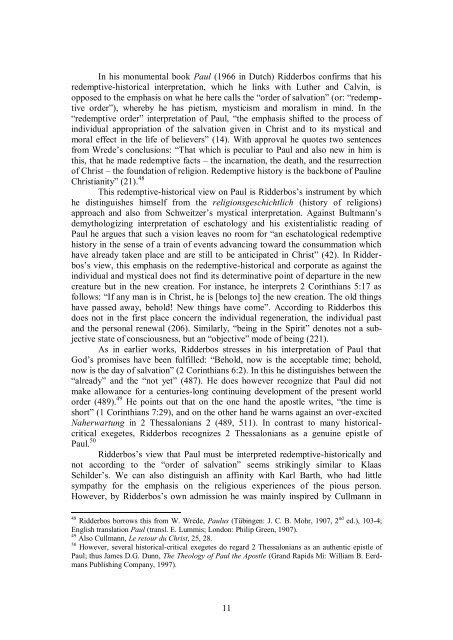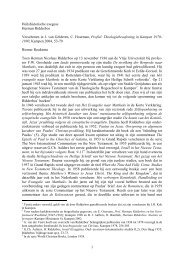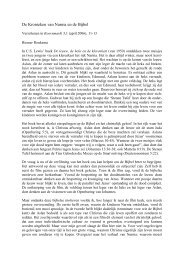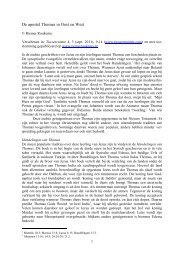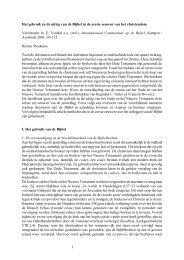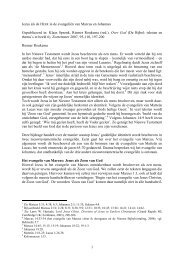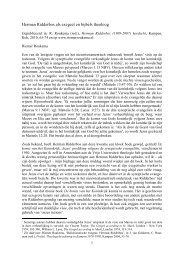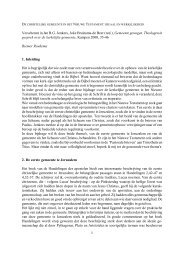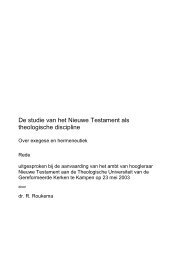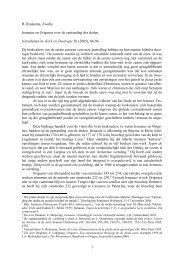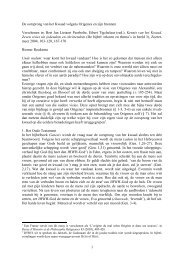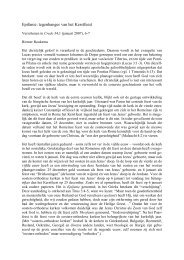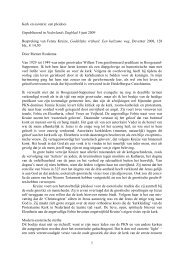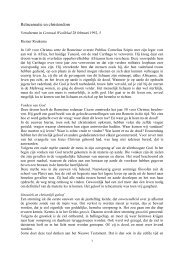Herman Ridderbos‟s Redemptive -historical ... - Riemer Roukema
Herman Ridderbos‟s Redemptive -historical ... - Riemer Roukema
Herman Ridderbos‟s Redemptive -historical ... - Riemer Roukema
You also want an ePaper? Increase the reach of your titles
YUMPU automatically turns print PDFs into web optimized ePapers that Google loves.
In his monumental book Paul (1966 in Dutch) Ridderbos confirms that his<br />
redemptive-<strong>historical</strong> interpretation, which he links with Luther and Calvin, is<br />
opposed to the emphasis on what he here calls the “order of salvation” (or: “redemptive<br />
order”), whereby he has pietism, mysticism and moralism in mind. In the<br />
“redemptive order” interpretation of Paul, “the emphasis shifted to the process of<br />
individual appropriation of the salvation given in Christ and to its mystical and<br />
moral effect in the life of believers” (14). With approval he quotes two sentences<br />
from Wrede‟s conclusions: “That which is peculiar to Paul and also new in him is<br />
this, that he made redemptive facts – the incarnation, the death, and the resurrection<br />
of Christ – the foundation of religion. <strong>Redemptive</strong> history is the backbone of Pauline<br />
Christianity” (21). 48<br />
This redemptive-<strong>historical</strong> view on Paul is Ridderbos‟s instrument by which<br />
he distinguishes himself from the religionsgeschichtlich (history of religions)<br />
approach and also from Schweitzer‟s mystical interpretation. Against Bultmann‟s<br />
demythologizing interpretation of eschatology and his existentialistic reading of<br />
Paul he argues that such a vision leaves no room for “an eschatological redemptive<br />
history in the sense of a train of events advancing toward the consummation which<br />
have already taken place and are still to be anticipated in Christ” (42). In Ridderbos‟s<br />
view, this emphasis on the redemptive-<strong>historical</strong> and corporate as against the<br />
individual and mystical does not find its determinative point of departure in the new<br />
creature but in the new creation. For instance, he interprets 2 Corinthians 5:17 as<br />
follows: “If any man is in Christ, he is [belongs to] the new creation. The old things<br />
have passed away, behold! New things have come”. According to Ridderbos this<br />
does not in the first place concern the individual regeneration, the individual past<br />
and the personal renewal (206). Similarly, “being in the Spirit” denotes not a subjective<br />
state of consciousness, but an “objective” mode of being (221).<br />
As in earlier works, Ridderbos stresses in his interpretation of Paul that<br />
God‟s promises have been fulfilled: “Behold, now is the acceptable time; behold,<br />
now is the day of salvation” (2 Corinthians 6:2). In this he distinguishes between the<br />
“already” and the “not yet” (487). He does however recognize that Paul did not<br />
make allowance for a centuries-long continuing development of the present world<br />
order (489). 49 He points out that on the one hand the apostle writes, “the time is<br />
short” (1 Corinthians 7:29), and on the other hand he warns against an over-excited<br />
Naherwartung in 2 Thessalonians 2 (489, 511). In contrast to many <strong>historical</strong>critical<br />
exegetes, Ridderbos recognizes 2 Thessalonians as a genuine epistle of<br />
Paul. 50<br />
Ridderbos‟s view that Paul must be interpreted redemptive-<strong>historical</strong>ly and<br />
not according to the “order of salvation” seems strikingly similar to Klaas<br />
Schilder‟s. We can also distinguish an affinity with Karl Barth, who had little<br />
sympathy for the emphasis on the religious experiences of the pious person.<br />
However, by Ridderbos‟s own admission he was mainly inspired by Cullmann in<br />
48 Ridderbos borrows this from W. Wrede, Paulus (Tübingen: J. C. B. Mohr, 1907, 2 nd ed.), 103-4;<br />
English translation Paul (transl. E. Lummis; London: Philip Green, 1907).<br />
49 Also Cullmann, Le retour du Christ, 25, 28.<br />
50 However, several <strong>historical</strong>-critical exegetes do regard 2 Thessalonians as an authentic epistle of<br />
Paul; thus James D.G. Dunn, The Theology of Paul the Apostle (Grand Rapids Mi: William B. Eerdmans<br />
Publishing Company, 1997).<br />
11


